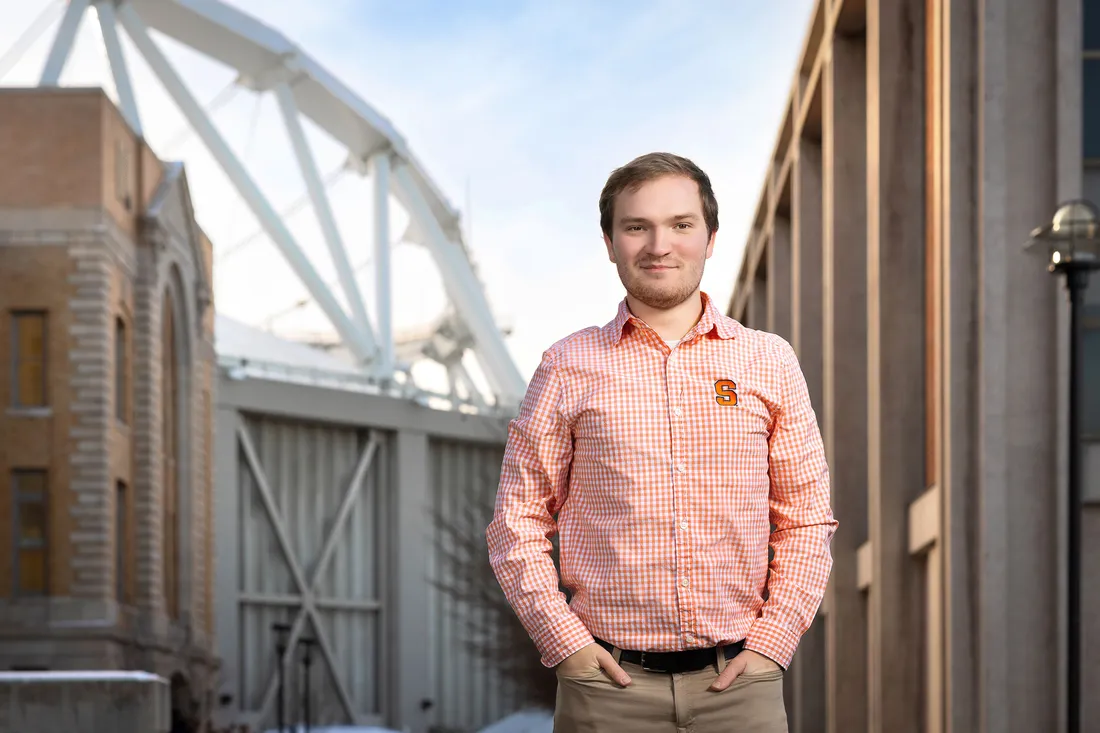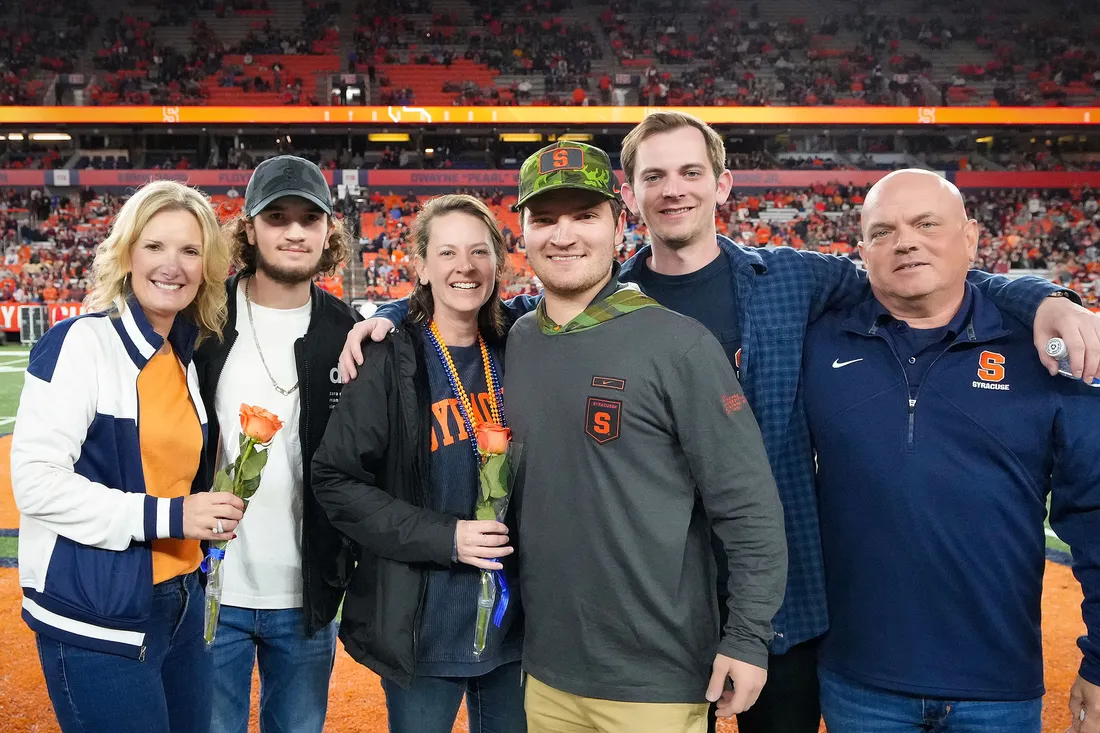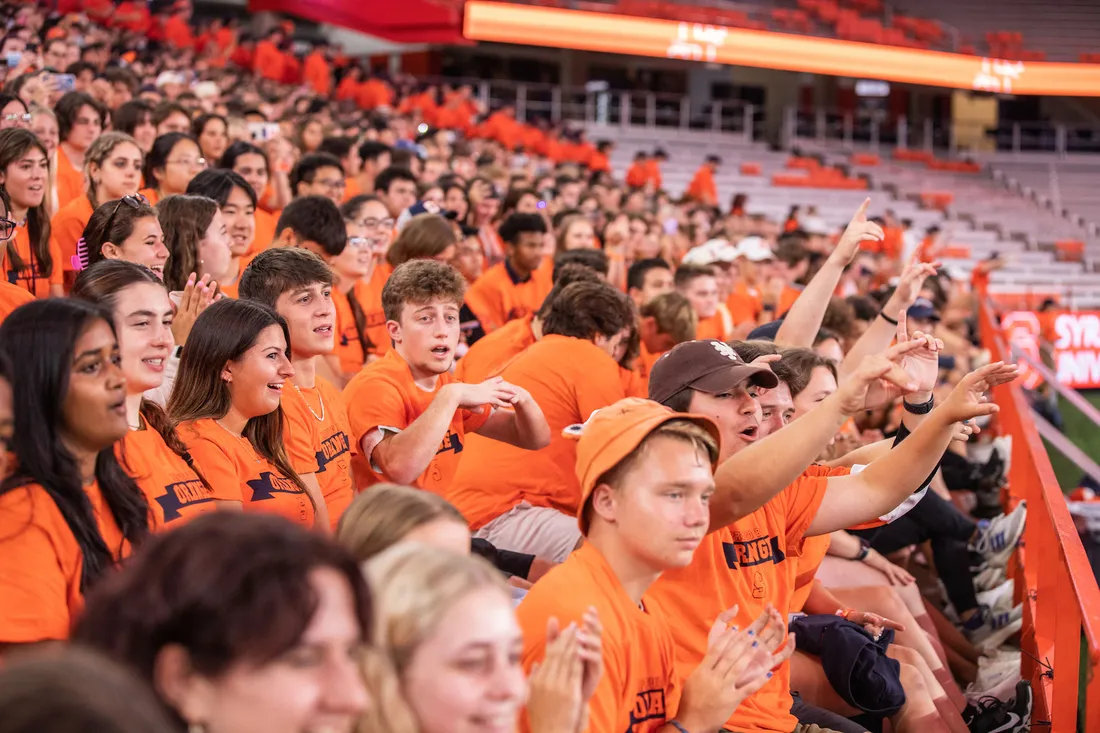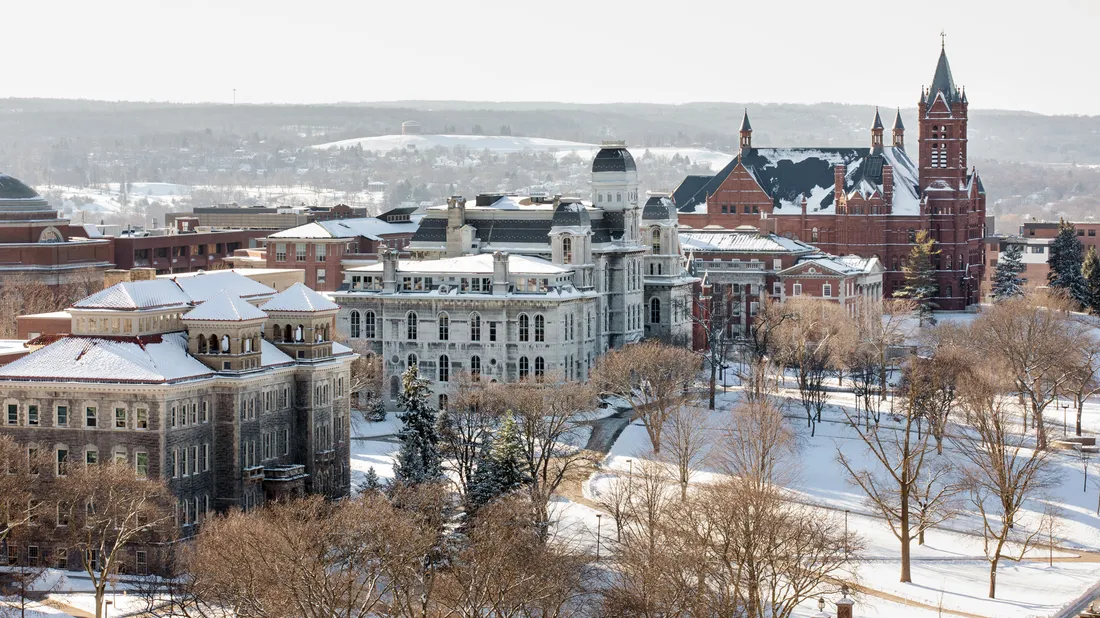
Social work senior David Sobczak ’23 has spent much of the last four years at the JMA Wireless Dome, where he developed his love of football into successful coaching experience.
Wilbert Montgomery knew there was something special about David Sobczak ’23 the minute he first saw him.
Montgomery, a former NFL star running back and Super Bowl-winning assistant coach, was watching his son participate in a football camp when he looked across the field and saw Sobczak, who was born with cerebral palsy and had difficulty walking.
What drew me to David right away was watching this young man being a competitor with what he was dealing with.
—Wilbert Montgomery, former NFL star running back and Super Bowl-winning assistant coach
Sobczak, a high school sophomore who had dreams of coaching in the NFL, was talking to a coach who told him that if he really wanted to coach football, he needed to talk to that man over there. He was pointing at Montgomery.
“I saw the struggle he was going through just to walk,” Montgomery says. “But he walked all the way around to the other side of the field to ask me if he could visit me sometime and talk about football. What drew me to David right away was watching this young man being a competitor with what he was dealing with.”
Montgomery, who has become Sobczak’s most trusted mentor, learned that day what many others have learned over the last several years—never underestimate David Sobczak.
Now a Syracuse University senior, Sobczak is walking without braces following multiple surgeries, and he’s finishing his fourth and final season as an offensive student assistant coach at Syracuse under head coach Dino Babers. On Dec. 29, the Orange will make their first bowl appearance since 2018 against the University of Minnesota in the Bad Boy Mowers Pinstripe Bowl at Yankee Stadium in New York City.
Sobczak is on track to graduate this spring with a degree in social work from the Falk College of Sport and Human Dynamics. He gravitated toward social work because of the time he spent in hospitals with other children and families who didn’t always have the resources to get the help they needed.
Studying social work has made me a better coach because you learn every individual is different. It’s taught me how to reach people who don’t come from the same background.
David Sobczak ’23
He says that once he’s established as an NFL coach he’d like to create a foundation to help families with their children’s hospital bills and serve as a role model for those with disabilities who have dreams of their own. “The biggest thing I always remind myself is that I have an opportunity to do something bigger than myself,” Sobczak says.

David Sobczak ’23 (fourth from left) and his family celebrate Senior Day, the last home game of the season. Football has always been in his roots—with his first memories spent watching the game with his father and grandfather.
Falling in Love With Football
Cerebral palsy is a congenital disorder that affects movement, muscle tone and posture. It’s caused by damage that occurs to the developing brain, often before birth, and isn’t always noticeable in the first year or so of a child’s life.
When Sobczak was barely a toddler, a neurologist determined that he had cerebral palsy—but it wasn’t degenerative, meaning that through braces, surgeries and physical therapy, he would still be able to walk. Naturally, Sobczak was frustrated by the braces, the bigger shoes he had to wear for support, and the constant trips and stumbles.
But two things happened during Sobczak’s childhood that would change the course of his life. He fell in love with football, and he developed a dynamic ability to talk with anyone at any time about anything, especially football.
Sobczak’s first memories of football are watching games with his father and his grandfather, Richard “Pop” Lutz, and throwing the football with them at halftime. Only later after Lutz had died, did Sobczak discover that Lutz was a Syracuse football fan.
Sobczak played flag football in elementary school but had to stop when boys his age started playing tackle football. By the time he reached middle school, he’d already had two surgeries. While his classmates were running around at recess, he was meeting with a physical therapist.
“I realized I couldn’t do the things that other kids do,” Sobczak says. “I had to navigate my world a little faster than others. Meaning, I had to find out early what can I do.”
It was during sixth grade, when his beloved Baltimore Ravens won the Super Bowl, that Sobczak chose a life in football. At first, he wanted to be a commentator. But then he figured if he wanted to be a great commentator, he’d have to master the sport first, so he should become a coach. From that point on, Sobczak couldn’t get enough of football. He studied games, read books and watched the NFL Network 24/7.
Calling the Plays
Sobczak’s first coaching “break” came in high school, when the head coach named him as a student coach assigned to work with the quarterbacks, scout upcoming opponents and help design game plans.
“I’d stay up late, study as much as I could and diagram plays,” Sobczak says. “I found football, I found coaching, and it was the first time in my life where I realized that this is something I can do and something that I love.”
There’s one thing of wanting to, and there’s another thing of getting out of your shell and getting comfortable being uncomfortable.
David Sobczak ’23
Sobczak also had the opportunity to network with other college and NFL coaches. The father of one of the high school quarterbacks was longtime NFL coach Marty Mornhinweg, who asked if Sobczak wanted to sit in on a meeting of the Ravens’ quarterbacks during offseason practice in the spring.
Sobczak then got to talk X’s and O’s with the likes of Super Bowl-winning quarterback Joe Flacco and rookie and future star Lamar Jackson. Later, with the blessing of head coach John Harbaugh, Mornhinweg called Sobczak to the sideline at practice, handed him a clipboard and asked him to call out the plays for Flacco and the offense.
“There’s one thing of wanting to, and there’s another thing of getting out of your shell and getting comfortable being uncomfortable,” Sobczak says.
Sobczak attended numerous Glazier coaching clinics when he was in high school to meet coaches and pick their brains. “He’d be the only kid attending and he grew really comfortable introducing himself to people, talking and sharing contact information,” his mother says.
That’s how he met Montgomery. “I thought he’d call me, we’d talk a little bit of football for 15 minutes, and that would be it,” Montgomery says, laughing. “But now it’s been years and we’re still talking.”
A Teacher and a Trust Builder
Since Sobczak arrived at Syracuse, Montgomery has emailed him after every Orange football game to share his thoughts. “Coaches, they’re a dime a dozen. But I saw that this guy here wants to be more than a coach, he wants to be a teacher,” Montgomery says. “A lot of people can coach, but to be a teacher it takes a different kind of guy who wants to do that. That’s how I view David, as a teacher first and a coach second.”
The biggest thing I always remind myself is that I have an opportunity to do something bigger than myself.
David Sobczak ’23
A successful teacher must be able to communicate with students, show empathy for their individual situations and build trust. These skills are also the building blocks of social work.
“David is very attuned to, and interested in, pursuing and maintaining relationships,” says his advisor, social work professor Ryan Heath.
“Studying social work has made me a better coach because you learn every individual is different,” Sobczak says. “It’s taught me how to reach people who don’t come from the same background. I think that’s a very important tool as a coach, because if you only reach a certain group of people, it’s going to be hard.”
Opportunity and Responsibility
Before he went off to college, Sobczak had surgery to have a baclofen pump inserted into his abdomen, delivering medicine directly to his spinal canal to reduce the spasticity of Sobczak’s leg muscles.
Sobczak was considering several colleges at the time, and Syracuse was on his list. He had met the coaching staff during a campus visit, and he was encouraged.
“When I got my baclofen pump put in my senior year, (Syracuse Director of Player Personnel) coach (Roy) Wittke reached out on behalf of the coaching staff to my mom and asked how I was doing,” Sobczak says. “I was a student coach (in high school) and I’d been on campus, but I never coached a day in my life (at Syracuse). When they reached out like that, I said this is where I’m supposed to be.”
I learned a lot, I failed a lot, and even with my disability, these guys have been supportive, and they’ve treated me just like they do the other players and coaches.
David Sobczak ’23
Sobczak has filled a variety of roles with the Orange, from working with the tight ends, running backs and special teams to scouting to designing plays on a computer for the offensive line to study. He’s made friends for life with the players and coaches, and he’s grateful that none of them “looked at me like I have a disability.”
“I learned a lot, I failed a lot, and even with my disability, these guys have been supportive, and they’ve treated me just like they do the other players and coaches,” Sobczak says. “Coach Babers has been awesome. Like any good coach, he’s been good to me, hard on me, and he’s given me opportunity and responsibility.”
Montgomery says he has no doubt Sobczak will be hired by the NFL because when a team interviews him “they’re not going to just be impressed, they’re going to be shocked by his understanding of the game.”
And if all goes as planned, Sobczak will also find a way to help those in need who may not have the support system in place that enabled him to realize his dream.


